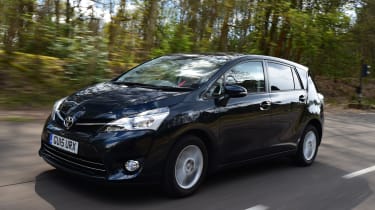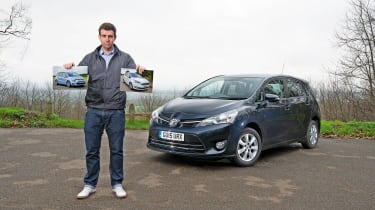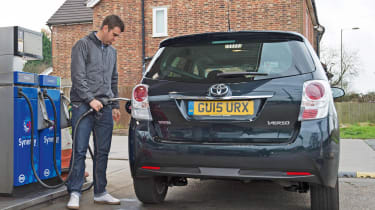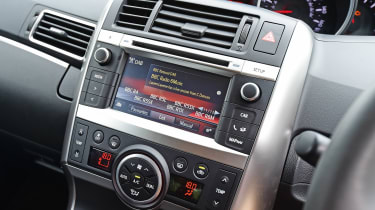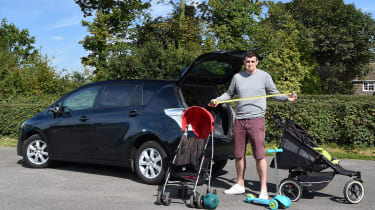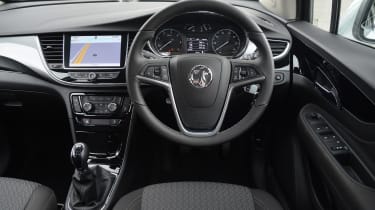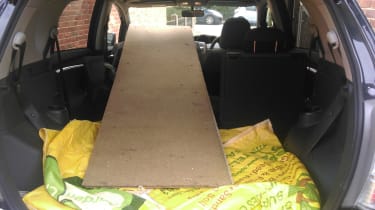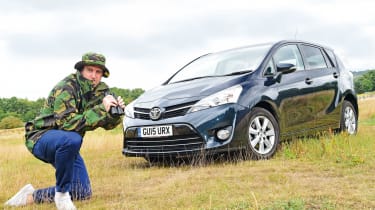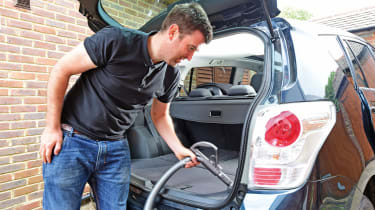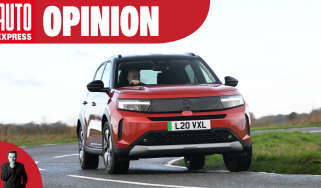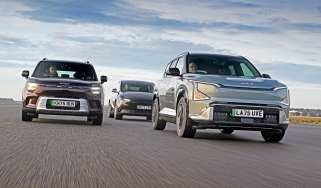Long-term test review: Toyota Verso
Final report: it's not the most exciting car, but we'll miss our capable Toyota Verso MPV

Other MPVs are more stylish, versatile and cost less to run, but few can match the Toyota’s ease of use and reliability. It’s simple to live with and makes transporting a young family as stress-free as possible. What sort of parent doesn’t welcome a car that makes their life easier?
Mileage: 5,623Fuel economy: 43.6mpg
The Toyota Verso is leaving our fleet, but what have we learned about both it and the wider MPV vs crossover debate?
As our Deep Titanium test car rides off into the sunset, we’re left to wonder what the future holds for the people carrier class. This type of car was once the obvious choice for a growing family, but has now been usurped by the fashionable crossover.
Crossovers promise to do everything an MPV can without making a driver look like they’re constantly on the school run. Their off-road overtones suggest the driver could be off mountain biking or kite surfing, even though they’re probably just dropping the kids off. Crossovers are just a bit sexier than MPVs and, as you may have heard, sexy sells.
That’s the backdrop against which we say goodbye to our mid-spec Verso Icon with its BMW-sourced 1.6-litre diesel. In general, it’s done a decent job, but its strengths centre around the way it makes family life easy, rather than the way it excites your senses.
Used - available now

2017 Vauxhall
Corsa
64,896 milesManualPetrol1.4L
Cash £5,295
2015 Volvo
XC60
148,809 milesManualDiesel2.0L
Cash £6,495
2016 Peugeot
308
51,200 milesManualPetrol1.2L
Cash £6,195
2018 SsangYong
Tivoli
69,204 milesManualPetrol1.6L
Cash £4,695The single best thing about the Verso was the way it eliminated the question: ‘Will it fit in the car?’ Obviously some people have much more to carry than I do, but on family holidays, supermarket trips and even visits to well known Scandinavian flatpack stores, the Toyota swallowed everything asked of it.
It’s a seven-seater as well, but those two rearmost seats spent most of their time stowed away. They’re tiny, so while toddlers will happily clamber in, even one smallish adult would have major problems fitting. There wasn’t even enough room to attach our child car seats in the third row, even with the middle bench pushed fully forward.
Accommodation in the front two rows is far better. The kids loved the Skyview panoramic roof and would insist on it being ceremonially opened before we began any journey. So it’s a shame it’s been dropped as an option, and is now only available on pricier Design and Excel models.
There’s also a comfortable driving position, plus plenty of seat and steering adjustment. In fact, the simplicity and solid feel of the seat mechanisms is another high point.
On the road, the car is comfortable and competent without really shining. We’ve never improved on our average 43-44mpg fuel economy, but that seems pretty good given how many miles we’ve done in town.
The 110bhp 1.6-litre diesel is reasonably quiet, but performance is modest; more so when fully loaded. It’s a similar story with the handling – although this is an easy car to drive, with light controls, it’s not particularly engaging.
So that’s the story with the Toyota Verso, and the MPV. On the whole, both lack pizzazz, but you shouldn’t write them off. While those practical qualities might not thrill in the showroom, in everyday life, they’re exactly what family car buyers need.
Third report: Toyota Verso
How does it compare to key rivals?
Mileage: 3,693Fuel economy: 42.0mpg
Perhaps more than any other kind of car, MPVs tend to be bought with the head rather than the heart. You probably never had a poster of a Renault Espace pinned alongside that Lamborghini Countach on your bedroom wall.
Even compared to models from other mainstream market sectors, MPVs focus on practicality, utility and affordability. They’re all qualities it’s tough to get overly excited about – until you have a family to transport.
Our time with the Toyota Verso has shown just how brightly a good people carrier can shine, simply by being easy for a busy family to live with. But how does the Verso stack up against its rivals?
Well, let’s find out. Our Toyota Verso is in middle-ranking Icon trim with the 1.6-litre 110bhp diesel. The list price is £21,995, but with metallic paint (£495), Toyota’s Touch 2 sat-nav (£650) and the Skyview panoramic roof (£550), the price steps up to £23,690.
Buyers considering the Verso are also very likely to be looking at the Ford Grand C-MAX and Citroen Grand C4 Picasso. The Ford costs £21,645 with 1.5 TDCi power and Zetec trim, while metallic paint and SYNC2 sat-nav add £1,025. The panoramic roof is restricted to higher-spec models, and without that the car is just over £1,000 cheaper than our Verso.
So how does the Citroen compare? In VTR+ trim with the BlueHDi diesel, it sets you back £21,725 – but you can get metallic paint, sat-nav and the panoramic roof for £23,818. That’s £128 more than the Toyota, but, crucially, the Citroen’s panoramic roof is part of the Style Pack, and its sat-nav is grouped with a Convenience Pack that adds 17-inch alloys and keyless entry.
The Citroen has a narrow edge on prices and spec, but it’s down on power and performance. The 1.6-litre BlueHDi diesel has 99bhp compared to 110bhp and 118bhp in the Toyota and Ford respectively.
The flipside of this is the Citroen’s superior 74.3mpg official economy and emissions that dip under the 99g/km barrier for free road tax. The Ford claims 64.2mpg and 113g/km, but the Verso lags behind with 62.8mpg and 119g/km.
When it comes to depreciation, the Toyota also trails. It’s predicted to retain 40.8 per cent of its value after three years and 36,000 miles, but the Grand C-MAX manages 44.7 per cent and the Grand C4 Picasso holds on to 46.8 per cent.
So with the numbers crunched, we’re left with a picture of our Verso struggling to keep pace. It’s no surprise that the Grand C4 Picasso is the Auto Express MPV of the Year.
All is not lost for the Toyota, though. MPV buying decisions might be commonly made on this kind of hard-nosed, unemotional basis, but personal taste is still a factor. The Verso’s tough, simple feel will count for a lot, as will Toyota’s reputation for reliability and customer satisfaction – as documented by our own Driver Power survey. Perhaps what we’ve really learned here is how tough it to choose from an array of decent MPVs.
Toyota Verso: Second report
Newborn tests family friendly Toyota Verso's practical promise to the max
Mileage: 3,016 Fuel economy: 43.7mpg
Children have an amazing way of changing your perspective on things. A month ago, our Toyota Verso was a spacious car with the kind of practicality I couldn’t envisage ever needing. Then Adam, our second child, came along, and suddenly the car is starting to look a little bit pokey.
It’s not time to panic just yet. Toyota’s mid-size MPV is still a roomy seven-seater with a 440-litre boot if you stick to five of those seats. It hasn’t even come close to running out of space yet, it’s just that I can foresee the terrible day when it won’t be big enough – a day I never thought possible.
There are now two child seats to fit in, plus a couple of pushchairs. That’s before you even start to factor in the baby baggage that accompanies a newborn, as well as all the usual stuff you need to bung in the back.
It all underlines the purpose of the MPV and why family buyers are forced to upgrade into them from conventional hatchbacks – meeting the needs of a space-hungry family of four (or more) is what cars like the Verso are designed to do. So, how’s it getting on?
The support for our car seat means that a front passenger of six foot tall or more can’t slide their seat back as far as they’d like, but otherwise, the bulky seat fits in fine.
There’s still room for a fifth passenger to squeeze in with the kids in the second row, yet it’s tight and there’s no telling how much crayon and chocolate they’ll get covered in. The Toyota’s seating system isn’t as slick as some, though.
• Best 7-seaters on the market
There are catches on each shoulder of the outer rear seats – one slides them forward for access to the third row and the other folds them. The process isn’t exactly seamless and can require a bit of elbow grease, but the catches are strong and the chairs move and clunk into place solidly.
Now that pushchairs have become an ever-present companion on family outings, we’ve started to make more use of the storage space under the Verso’s boot floor, which can easily fit a couple of shopping bags. Our car has got this practical touch because, as in all models featuring the optional panoramic roof, there’s a tyre repair kit instead of a space-saver spare wheel.
This is done to balance out the extra weight of that glass roof and stop the Toyota’s emissions creeping into the next tax bracket. The roof is very nice and the underfloor space is handy, but I think I’d probably save myself £550 and have the proper space-saver for extra peace of mind.
Elsewhere in the boot, you get a couple of proper tie-down points and a 12V power socket in addition to the one in the front. With all the seats down, there’s a good flat surface without too many gaps that would make it tricky to vacuum out.
Our pushchairs fit inside and there’s still room for plenty of other stuff piled on top, so space hasn’t been an issue yet. During a bout of pre-baby DIY, we even got six eight-foot flooring boards plus two adult passengers inside. I’d say that qualifies it as a capable load carrier.
So, suddenly, we have a family that fits the Verso rather than one that was rattling around a bit in the roomy MPV. As every parent knows, one extra child makes a lot of difference, and the rest of the test is going to be a lot tougher on our Toyota.
Toyota Verso: first report
Solid, practical seven-seater Verso has quickly established itself as a likeable family car
Mileage: 2,337Fuel economy: 46.6mpg
What do you want your family car to do? It obviously needs to fit you and all your stuff inside, and it should avoid depleting the household budget to the extent that the kids end up unwrapping a potato each on Christmas morning.
• Best 7-seaters on the market
That’s a given – but at a more basic level, would you rather have a family vehicle that’s exciting, or one that can blend seamlessly into your everyday life?
This question has been brought into sharp focus in my first few weeks with the Toyota Verso. Let’s establish right off the bat that even within the utilitarian confines of the mid-sized MPV sector, this is not a particularly exciting car. What it does do is deliver a high degree of practicality in a pretty uncomplicated and tough-feeling package.
Toyota has ridden to the top of the global sales charts on models such as the Verso – sturdy, reliable and sensibly priced cars for buyers who don’t want to be bothered by all the flannel that comes bundled up with some of the alternatives. The Verso has been on sale since 2009 and is showing its age in places, but it’s still very likeable.
It’s slotted into the family car role very well in my household. It’s a seven-seater yet, as with most owners, we’ve had cause to unfurl the two back seats on only a few occasions.
They’re OK for small kids, but the lack of legroom means you wouldn’t wish them on an adult. It’s telling that rivals such as the Ford C-MAX and Citroen C4 Picasso offer seven seats, but only in extended Grand versions of the base cars offering more space.
When sticking to its ‘five seats and big boot’ configuration, the Verso is a very roomy car. The luggage area has a flat floor and no loading lip to speak of, while the rear seats slide to increase either carrying space or legroom. In the front, there are two gloveboxes – twice as many as you’d expect.
The plastics look a bit low-rent in places, and you don’t get the glossy or soft-touch finishes you’d find in some rivals. But all the seat mechanisms, switches, flaps and lids generally feel like they’ll last.
Our Verso is a 110bhp 1.6-litre diesel in mid-range Icon trim. At £22,000 it’s the sweet spot in the range, yet we dipped into the options bucket for metallic paint, the Skyview panoramic roof and Touch 2 infotainment system with sat-nav. All of these seem like decent investments, but they do take the list price to £23,690.
By modern standards the sat-nav screen is too small, but the touch controls make it easy enough to move between menus and program your route. One quirk of the Verso’s spec is that you get a rear-parking camera as standard, but no sensors. The compact screen isn’t the best for judging distances without the aid of those warning bleeps.
On the road the Toyota is reasonably comfortable – although the occasional shudder runs through the suspension over big bumps – and it resists rolling around too much through direction changes. It’s not the most thrilling drive, however, and while the diesel is smooth it’s not overly torquey and you’re often forced to drop a gear to accelerate from low speeds.
If you want to stand out from the crowd, the Verso may not be the model for you. But if your family car ambitions extend only to something efficient that doesn’t cost the earth, the Toyota looks like a very safe bet.
*Insurance quote from AA (0800 107 0680) for a 42-year-old living in Banbury, Oxon, with three penalty points.
**Option is now discontinued


